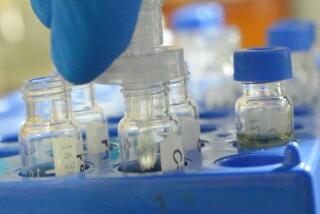Lab analyst admits to time gaps in Landis tests
- Share via
Defense lawyers for Tour de France champion Floyd Landis on Wednesday began building their case that the French laboratory that found he tested positive for testosterone is inept and dishonest, contending that its analytical records are rife with unexplained time gaps that may conceal efforts by lab personnel to manipulate test results.
The target of the attorneys’ barbs was Cynthia Mongongu, a supervisory analyst at the French government doping laboratory in Paris.
Mongongu conducted the most important test on Landis’ urine sample from Stage 17 of the Tour de France and double-checked a colleague’s analysis of Landis’ backup, or B, sample from the same stage.
The lab, known by its initials LNDD, ruled that a carbon isotope ratio assay showed both samples to be positive for testosterone use, triggering the doping contention last summer.
The 31-year-old American cyclist is contesting the accusation at a hearing before three arbitrators at Pepperdine University in Malibu. The case is being prosecuted by the U.S. Anti-Doping Agency (USADA).
Mongongu also performed the analyses on most of the seven other urine samples taken from Landis during the 2006 race. These samples, which LNDD originally ruled clean after a rudimentary screening, were reanalyzed in April using the more exacting carbon isotope test. Four were then declared positive for testosterone use.
Landis is hoping to convince the three arbitrators that LNDD’s performance falls far short of the standards for anti-doping labs set by the World Anti-Doping Agency (WADA), which is the accrediting agency for LNDD and 33 other such facilities around the world. If he succeeds in doing so, then USADA will face the difficult burden of proving that the flaws in the lab’s technique did not cause the positive readings on his sample.
The strategy requires Landis’ defense to delve into the lab’s methodology in numbing detail. Such microscopic scrutiny is rare in anti-doping cases.
Landis was forced to appeal several times to the arbitration panel to gain access to data his defense regarded as crucial.
For the most part, cross-examination by Maurice Suh, a Landis attorney, focused on numerous unexplained gaps in LNDD’s records of the carbon isotope tests on Landis’ samples.
The test involves an instrument that analyzes the constitution of more than a dozen chemical samples, including eight control samples designed to verify the equipment’s accuracy. The test is designed to be automated, so that all the steps take place sequentially over a period of about seven hours without any intervention by an operator.
The tests on Landis’ Stage 17 samples, however, each appear to have included an unexplained gap of about five hours between two of the steps.
“Tell me what happened here,” Suh said to Mongongu, referring to one of the gaps.
She said “there was a problem,” and that she had to implement one of the steps manually. Although such a departure from routine normally requires written documentation under WADA rules, Mongongu acknowledged that she made no note of the problem at the time.
Mongongu acknowledged that at several points during the April retests, she intervened manually in the test sequence because the instrument had produced a result that was “undoubtedly not correct.” She did not document her action at the time, she acknowledged.
The incorrect or unacceptable results being produced by the machine tended to involve calibrations or verification runs, rather than readings on Landis’ samples. But the defense may be intending to argue that the inadequacy of the machine casts doubt on Landis’ results.
Mongongu’s testimony suggested that the performance of the machine had been erratic for years; under questioning by Howard Jacobs, another lawyer for Landis, she said that she had had to summon a manufacturer’s technician roughly 10 times since September 2003 to repair the hardware.
Records of the retesting in April indicated numerous similar gaps in documentation, some of them covering periods of more than an hour. Mongongu testified she could not recall the reason for the gaps.
Mongongu had defended her technique Tuesday under direct questioning by a USADA attorney. On Wednesday, however, she acknowledged that she had failed to document several steps in her analysis of Landis’ Stage 17 sample, including where and when she acquired the sample vial and when she passed it on to the next technician in line.
Mongongu was also asked about a leak of the April results to L’Equipe, a French sports journal. L’Equipe’s report that several of the tests had returned positive results appeared on April 24 -- the morning after the tests were completed.
Mongongu denied passing the results to L’Equipe or knowing who did. She also said that she was never questioned on the matter by the lab’s director, Jacques De Ceaurriz.
Landis, 31, faces a two-year suspension from competition and the loss of his Tour title if the contention is upheld and a subsequent arbitration appeal fails.
More to Read
Sign up for Essential California
The most important California stories and recommendations in your inbox every morning.
You may occasionally receive promotional content from the Los Angeles Times.










